
Our School Vision
As a Church of England Junior School, we are required to have a vision that is both biblically underpinned and rooted in the needs of the community we serve. At William Ford Church of England Junior School, our vision has been prayerfully shaped through a deep understanding of our local context — the borough of Barking and Dagenham as a whole, and specifically the Village Ward in which our school is situated.
We recognise that our community is richly diverse, shaped by a wide range of cultural, social, and economic backgrounds. In response, our vision and values are designed to offer hope, belonging, and purpose to every pupil, preparing them to thrive in life and to make a positive difference in the world.
This same understanding also informs our curriculum intent, ensuring that what we teach is not only ambitious and inclusive but also meaningful and relevant to the lives of the children and families we serve.
Our community context
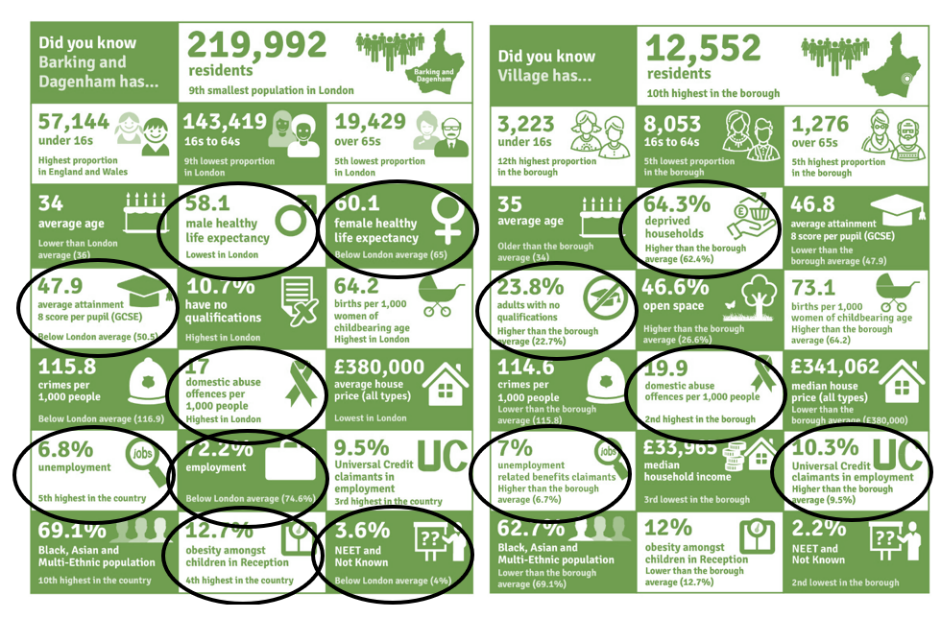
William Ford Church of England Junior School serves a community facing significant socio-economic and educational challenges. In the Village Ward, over 64% of households are classified as deprived, nearly a quarter of adults have no qualifications, and domestic abuse rates are among the highest in the borough. Families experience high levels of in-work poverty, with many children growing up in homes where educational attainment, household income, and long-term health outcomes are below national and borough averages. These contextual factors shape our moral and educational imperative.
So, what can we do about this?
Our vision
Supporting pupils to be successful, healthy, fulfilled and empowered to make a difference - strengthened by the hope and example of God.
“Show me your ways, Lord, teach me your paths. Guide me in your truth and teach me.” - Psalm 25:4–5a (NIV)
When we say we are "strengthened by the hope and example of God," we mean that our school is shaped by something deeper than ambition alone. Our hope is the quiet confidence that God is faithful and present, even when life is hard. It gives pupils and staff the courage to grow and the strength and direction to keep going. We look to the example of Jesus to guide how we treat others, how we serve, and how we live. His compassion, honesty, and care shape the values we teach. We trust that God is guiding our pupils and staff each day—helping them to walk in truth, grow in wisdom, and become all they are created to be. This hope and example influence everything we do and help our children to thrive not just in learning but in who they are becoming.
What this looks like across our school and curriculum
To be successful:
- Pupils experience a purposeful and ambitious curriculum rooted in real and fictional roles (e.g. authors, engineers, health advisors).
- They develop critical thinking, communication, creativity, and collaboration in every lesson.
- Careers education is integrated throughout all year groups, so children see the value of learning and aspire beyond the classroom.
- We help children be successful in following God’s purpose for their lives: “Commit to the Lord whatever you do, and he will establish your plans.” (Proverbs 16:3)
We expect our pupils, parents and staff to show commitment to learning, encouragement for others, and pride in achievement.
To be healthy:
- Children learn to keep physically fit and make healthy choices in food and lifestyle.
- Mental health and wellbeing are prioritised through Place2Be, positive relationships, and emotional literacy work.
- Pupils are supported to be spiritually healthy – recognising the strengths and weaknesses of their own and others beliefs.
- We teach pupils to be spiritually healthy by growing in faith and confidence: “When pride comes, then comes disgrace, but with humility comes wisdom.” (Proverbs 11:2)
We expect our pupils, parents and staff to promote positive choices, support wellbeing, and care for one another’s mental, physical and spiritual health.
To be fulfilled:
- All pupils take part in 11 engaging experiences across Years 3-6, from theatre visits to cooking meals and community service.
- The curriculum is designed to be awe-inspiring and meaningful, helping children to find purpose and joy in learning.
- Behaviour, praise, and reward systems build self-esteem and pride in personal growth.
- I know that there is nothing better for people than to be happy and to do good while they live. That each of them may eat and drink, and find satisfaction in all their toil—this is the gift of God.
We expect our pupils, parents and staff to take joy in learning, contribute to school life with enthusiasm, and recognise each person’s unique gifts.
To be empowered to make a difference:
- Pupils are encouraged to lead, serve, and contribute to their local, national, and global communities.
- Through projects, performances, and problem-solving, pupils are taught they can be agents of change.
- From school radio to community events, every child’s voice and actions matter.
- We follow Jesus’ example of serving others: “Serve one another humbly in love.” (Galatians 5:13)
We expect our pupils, parents and staff to lead by example, stand up for what is right, and act with compassion and service in our community.
Our Christian vision shapes everything we do.
Every pupil at William Ford is seen as unique, valued, and full of God-given potential. We believe that through hope, encouragement, and purpose, children don’t just survive—they thrive. Our vision:
- It is our curriculum intent – it drives our approach to the curriculum
- It shapes our approach to inclusion – ensuring all pupils across the school can thrive, regardless of background or circumstances.
- It informs our behaviour policy, recognising and rewarding children who strive for success, demonstrate healthy approach to life (physically, academically or spiritually), fully participate in the wider life of the school and work to make a difference to the lives of others.
- It determines our approach to staffing, recruiting and retaining individuals who uphold our vision but also ensuring we ensure they too are:
- Successful in their careers through CPD
- Healthy through appropriate wellbeing and work-life balance
- Able t be fulfilled through generous leave and support for family events
- Have opportunities to make a difference to the school community and beyond through volunteering, without compulsion.
Our governing body plays an active and strategic role in championing the school’s Christian vision. Governors regularly review the impact of our vision through visits, monitoring of curriculum implementation, pupil voice, attendance, behaviour and wellbeing surveys. In our most recent OFSTED inspection the vision-rich curriculum was recognised as a key factor in improving attendance across the school.
As a result we are assured that our vision is not just aspirational, but embedded and effective in bringing about positive change for all pupils.”
Our values
Although there is a diversity of belief and emphasis within our existing school community, we do ask that everyone at William Ford understands our values and endeavours to join us in living them out, whatever their particular task or role. By values we mean descriptions of the way in which we hope every member of the school, adults and children, will conduct themselves through life. In short they answer the question: how do we do things round here?
The school community chose values that are based on the key part of Jesus’ ministry: His death and resurrection. From the gospels’ retelling of events we chose the following values for our school: Humility, Service, Forgiveness and Repentance and Hope.
If you and your child(ren) would like to explore the school values together further, we have some suggested activities below that all the family can enjoy:
Humility - Roman Centurion – recognised he was wrong and that Jesus was the son of God
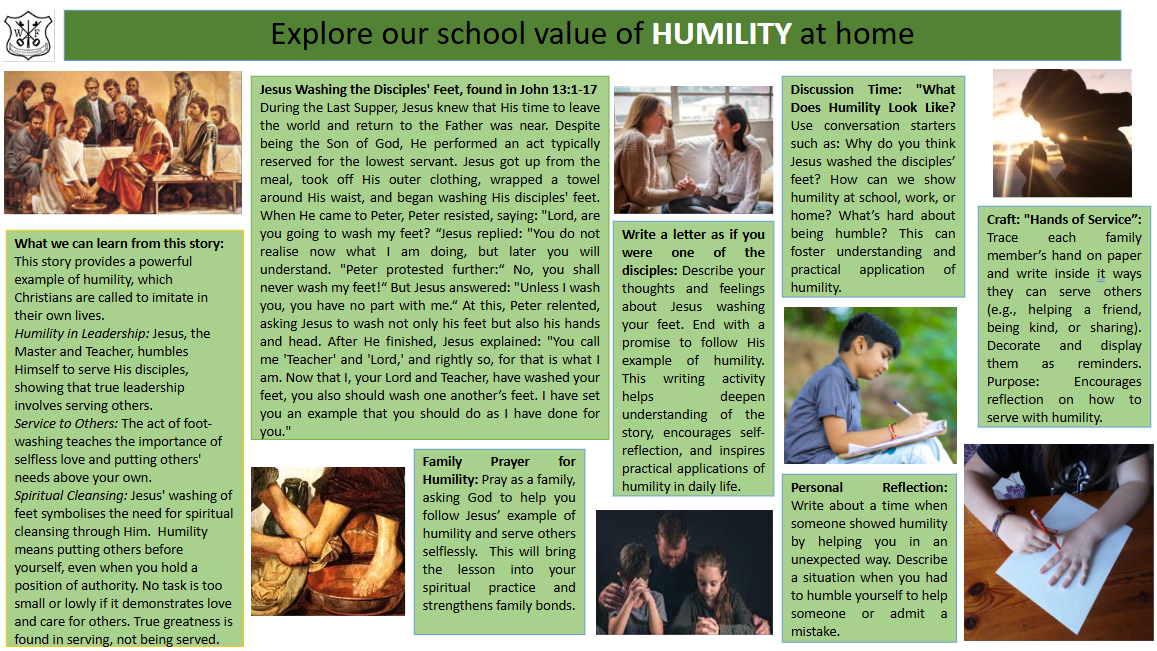
Service - Women who ministered to Jesus
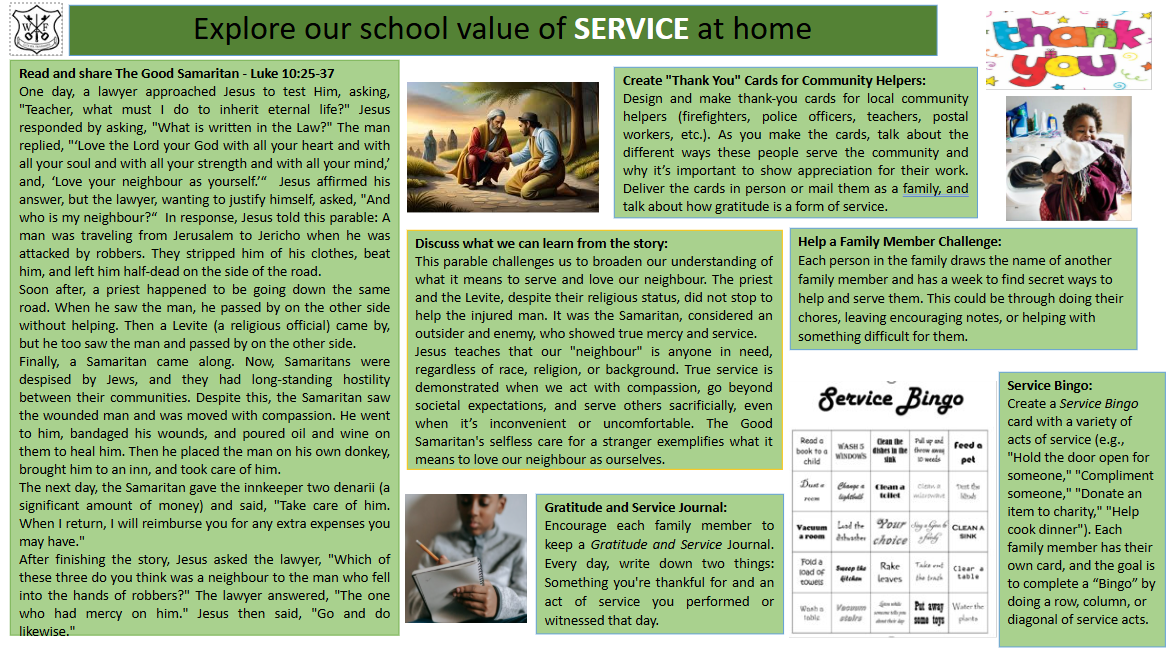
Repentance – Criminal on the cross who asks Jesus for forgiveness
Forgiveness – Jesus: “forgive them father for they know not what they do”
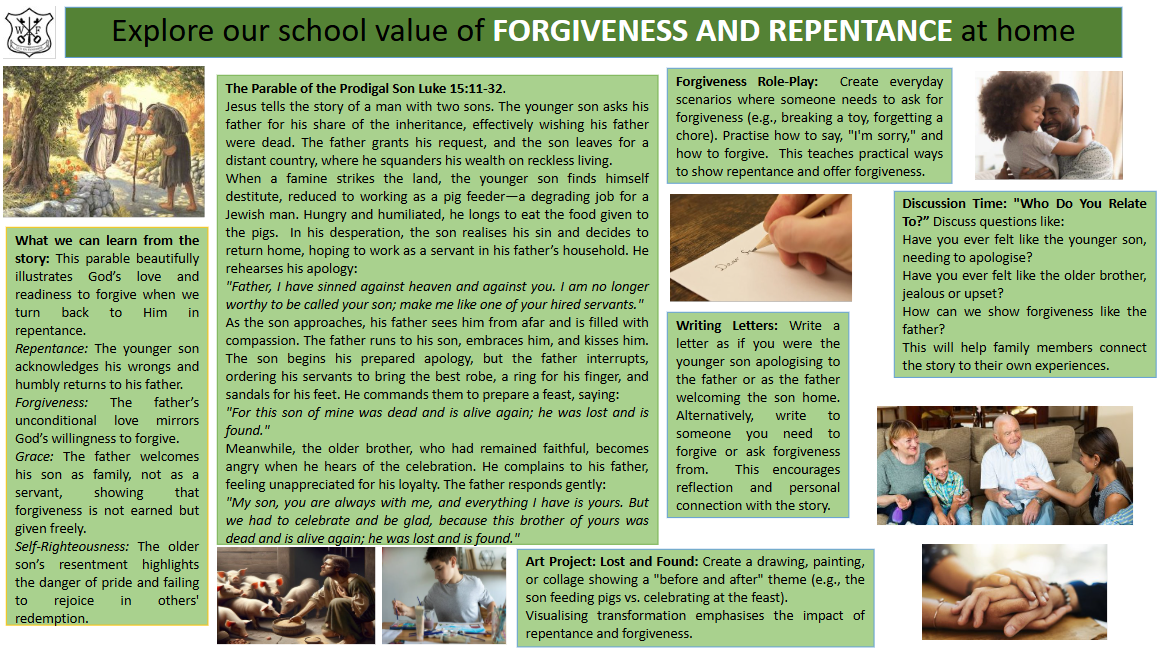
Hope - Resurrection – Jesus gives us hope
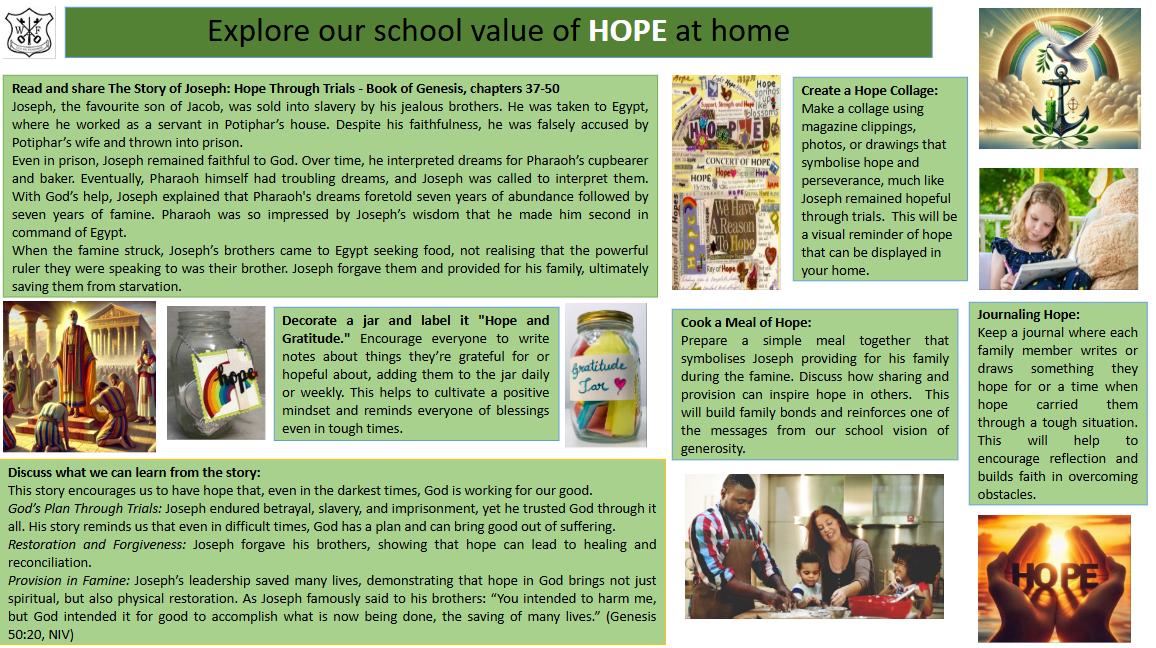
Children learn more and engage with our vision and values through our annual ‘Vision Day’ and ‘Values Day.’
High-quality Religious Education and daily Collective Worship help pupils to explore and live out our vision and values: Humility, Service, Forgiveness & Repentance and Hope - in a meaningful Christian context. We work in close partnership with our local church, parents and community organisations so that the values of service and hope extend beyond the school gates. New staff are inducted into our Christian vision and supported through mentoring to see how it informs their teaching, leadership and wellbeing. This helps ensure that everyone at William Ford is empowered to flourish and make a difference.

